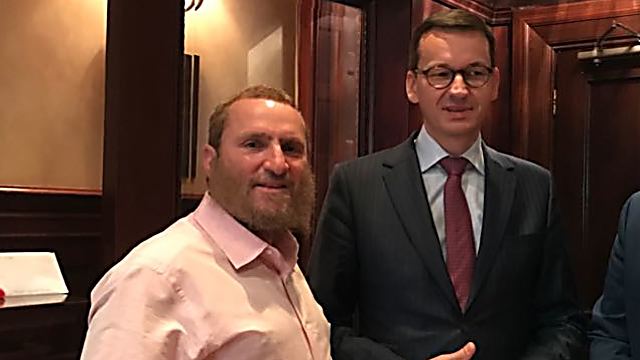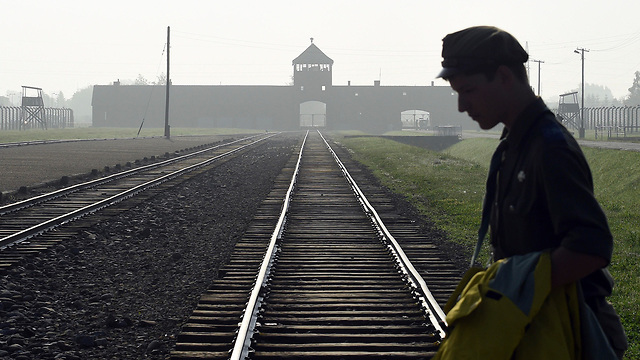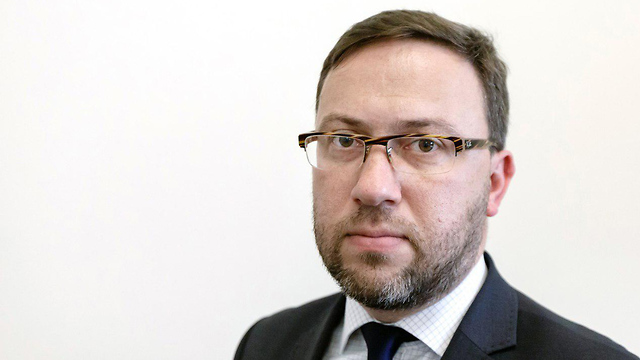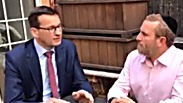
Polish Prime Minister Mateusz Morawiecki has asserted in a letter to his friend Rabbi Shmuley Boteach that no Jews could have survived the Holocaust without help from Poles.
"No Jewish family, none of our Jewish brothers and sisters, could be saved during the Shoah without some form of help from Polish families, from Polish neighbors," Morawiecki wrote to Boteach, and further maintained that a fair analysis of the circumstances surrounding the rescue of 300,000 Polish Jews during the war clearly showed that "several times more Poles were involved in rescuing (Jews)" than were involved in persecuting them with the Nazis.
"'I did not know a family in which Jews would not be hidden'—this phrase (was) very often used in Poles' wartime accounts," he wrote, saying it was "key to understanding complicated Polish-Jewish relations and was confirmed by numerous Jewish accounts."
The personal correspondence, obtained by Ynet, shows the friendship between the Polish premier, who has been at the center of controversy surrounding the Polish Holocaust Law criminalizing the ascription of culpability to Poland for crimes in World War Two, and Rabbi Boteach, known as the "celebs' rabbi" and a celebrity in his own right.
Their friendship dates back to Morawiecki's time as his country's treasury minister, with the Polish leader being received at Boteach's New Jersey home and was even recently invited to his traditional New York gala event.
In their personal correspondence, Morawiecki expressed his frustration with the crisis engendered between Israel and Poland and determined it was the result of misunderstanding the move the Polish nation wished to bring to fruition: removing responsibility for Nazi crimes during the war from Polish state institutions and citizens.
"Tensions between Israel and Poland deeply sadden me," Morawiecki wrote, adding "an unfortunate lack of proper communication and unintended misunderstandings" played a role in the diplomatic crisis.
"Poland is a firm ally of Israel, and amid the rising wave of anti-Semitism in Europe, our country is again the safe haven for the Jewish community—as it was throughout the eight centuries before World War Two," he asserted.
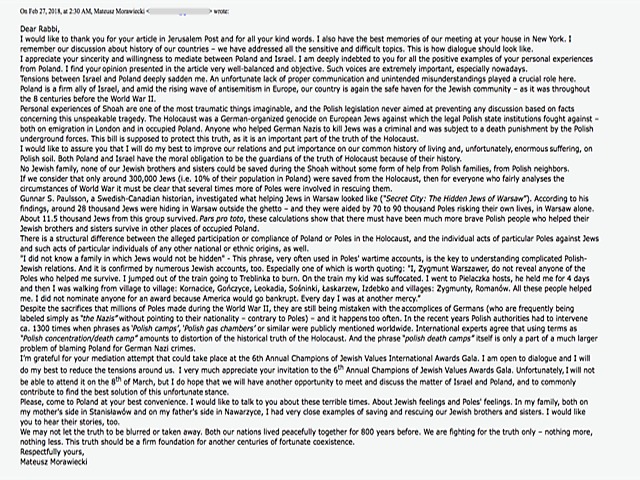
Despite expressing his concern, Prime Minister Morawiecki insisted the law was necessary to see justice done for the Polish people, who—he said—were falsely accused while they were, in fact, responsible for saving tens of thousands of Jews during the Holocaust.
'Bill is supposed to protect the truth'
Morawiecki stressed there was a "structural difference between the alleged participation or compliance of Poland or Poles in the Holocaust, and the individual acts of particular Poles against Jews, and such acts of particular individuals of any other national or ethnic origins."
This, perhaps, hinted at Morawiecki's past assertion that Jews were somehow complicit in the Holocaust as well, iterated to Yedioth Ahronoth journalist and son of Holocaust survivors Ronen Bergman recently.
"The Holocaust was a German-organized genocide of European Jews against which the legal Polish state institutions fought—both the (exiled government) in London and in occupied Poland. Anyone who helped German Nazis to kill Jews was a criminal and was subject to a death punishment by the Polish underground forces. This bill is supposed to protect this truth, as it is an important part of the truth of the Holocaust," Morawiecki wrote.
The Polish prime minister's letter to Rabbi Boteach showed he wished to clear the reputation of the Polish nation, albeit not at the expense of the victims. "Personal experiences of the Shoah are one of the most traumatic things imaginable, and the Polish legislation never aimed at preventing any discussion based on facts concerning this unspeakable tragedy," he clarified.
"Despite the sacrifice that millions of Poles made during World War Two, they are still being mistaken with the accomplices of Germans—and it happens too often."
To illustrate the point, he noted that Polish authorities had to intervene in some 1,300 instances in the past few years of mentions in world media giving off the impression that concentration camps built on Polish soil were a localized initiative.
"International experts agree that using terms as 'Polish concentration/death camps' amounts to distortion of the historical truth of the Holocaust," he said, adding "The phrase 'Polish death camps' itself is only a part of a much larger problem of blaming Poland for German Nazi crimes."
On the future of Israeli-Polish relations, Prime Minister Morawiecki said that, "I would like to assure you that I will do my best to improve relations and put importance on our common history of living and, unfortunately, enormous suffering on Polish soil. Both Poland and Israel have the moral obligation to be the guardians of the truth of the Holocaust because of their history."
To further promote relations, the prime minister invited the American rabbi to his residence to personally take in the history of saving Jews in Poland, as well as his own personal family history.
"Please, come to Poland at your best convenience," Morawiecki wrote. "I would like to talk to you about these terrible times. About Jewish feelings and Poles' feelings. In my family, both on my mother's side in Stanisławów and on my father' side in Nawarzyce, I had very close examples of saving and rescuing our Jewish brothers and sisters. I would like you to hear their stories too.
"We may not let the truth be blurred or taken away. Both our nations lived peacefully together for 800 years before. We are fighting for the truth only—nothing more, nothing less. This truth should be a firm foundation for (more) centuries of fortunate coexistence," Morawiecki concluded his missive.
Israel Postal Company freezes issuing joint Polish-Israeli stamp
The Israel Postal Company has recently decided not to issue a joint Polish-Israeli stamp because of the crisis over the Holocaust Law, with the Foreign Affairs Ministry's European division recommending postponing the stamp.
The Ministerial Committee on Symbols and Ceremonies, chaired by Culture Minister Miri Regev, approved the issuing of the stamp on December 21, 2017. The committee's decision received the standing of a government decision on January 5 of this year.
Following the decision, Israel Post began moving forward on issuing the stamp. But when the crisis with the Polish government erupted, Israeli officials surmised it was not the time to issue such a stamp.
"It's better to wait due to (the matter's) sensitivity," sources said. "It's not completely off the agenda. It could theoretically still happen this year, if the crisis is resolved. Both sides have a desire to contain the crisis."
A Polish delegation headed by Deputy Foreign Minister Bartosz Cichocki arrived in Israel this past Thursday to attempt to defuse the combustible situation between the two countries.
Deputy Minister Cichocki denied reports Tuesday that the US was punishing Poland over the controversial new law. Washington was expressing "concerns and questions" about the law, he said, but reports of sanctions were untrue.
The Polish government was reportedly told that the country's president and prime minister cannot count on any meetings with either President Donald Trump or Vice President Mike Pence until Poland changes the law, according to Polish news portal Onet.pl.
Onet said it has seen documents confirming the ultimatum, and that the Americans also threatened to block the financing of joint military projects.
Reuters and Itamar Eichner contributed to this report.















